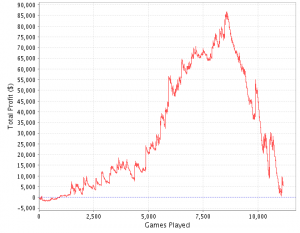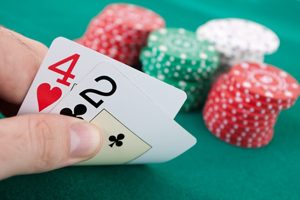 In poker, there are two unavoidable things: downswings and taxes. The best poker players are so successful and brilliant because they have gone through downswings deeper than anyone else. Statistically, it has been established that the longer you play poker, the stronger the downswing will be.
In poker, there are two unavoidable things: downswings and taxes. The best poker players are so successful and brilliant because they have gone through downswings deeper than anyone else. Statistically, it has been established that the longer you play poker, the stronger the downswing will be.
We naturally tend to think of ourselves as poker players in terms that describe how we are when things are going well and we are successful. However, how you deal with downswings is just as important, if not more important, a part of your true potential in the poker world. I'll repeat, how you handle downswings is a crucial skill. Being the best poker player is not just about accumulating capital from upswings and beautiful graphs and moving forward. A large part of the journey involves dealing with downswings. It's about gritting your teeth, punishing yourself over and over, day after day, and holding on firmly. Being a great poker player when you're winning is not enough.
You must understand that at any moment there is a possibility that you will be hit by a storm of variance, so big and powerful, so destructive that you might not survive it, so fierce that it will break you. And one day, if you continue to play poker, you will face a downswing that is bigger, deeper, and longer than you thought possible. This is a statistical fact. No amount of good play, prayers, or good karma will protect you from it. It's just a matter of time. So, the question is this. How strong are you really? How big a storm are you prepared to withstand?
There are many players who have performed fantastically while floating in the ocean of a good run. However, when they could no longer handle the storm that hit them, they were left in oblivion. This is one of the oldest
stories about poker, but it keeps repeating itself, even though it is not talked about loudly.  Most often, poker stories revolve around successful, skyrocketing graphs and smooth, steady win rates. The masses of people playing poker seek out these stories, they select only such stories and surround themselves with them from all sides, as if trying to shield themselves from reality. But poker is what it is, it's like an unpredictable lover.
Most often, poker stories revolve around successful, skyrocketing graphs and smooth, steady win rates. The masses of people playing poker seek out these stories, they select only such stories and surround themselves with them from all sides, as if trying to shield themselves from reality. But poker is what it is, it's like an unpredictable lover.
So, skills and win rate in poker should not only be measured by how well you play when you have a good run, but also by how well you play when the run turns bad. The win rate during a bad period is part of your overall winning rating over the long term. This seems obvious, but most players, without even thinking, do the opposite when calculating it. When you monitor your win rate during a good run and play well, it is not real because it is positively skewed.
When you are in a downswing, you always play worse. How much worse? It depends on your emotional skills in dealing with downswings. So, we should ask a more pressing question. What tools do we need to have to deal with downswings and how can we strengthen our emotional skills?
Imagine your worst downswing. Close your eyes for a minute and let your imagination work. Think about the weeks, months it lasts. Losses day after day. The constant need to reduce the sense of improvement. You lose one day, hoping to recover the next, but the next day you lose even more, and the next day even more, and so on. Maybe you are no longer that good player, maybe you were wrong all along, or maybe you lost the skills you once had? It feels like poker is punishing you. An overwhelming and indiscriminate sense of injustice. But the worst part is that you feel like you're rolling downhill. Like you're no longer climbing to the heights. You feel like you've started to slowly and indefinitely descend and that things will never get better. These feelings feedback into despair. Because of the bad period, you lose confidence in yourself, you think you will never win again, so you play worse and tilt more often, which makes you believe even more that things will never get better. It becomes a vicious circle, like a snake eating its own tail. Such a period is sometimes called “hell in poker.”





